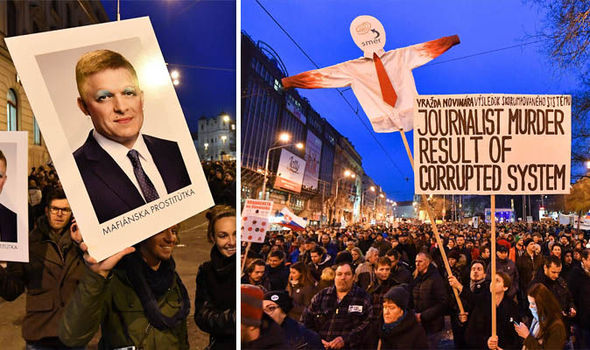Andrea Marková
March 14, 2018 OpinionSlovak PM Fico won't survive fallout from murder of journalist Jan Kuciak

Slovakia is awaiting early elections because Prime Minister Robert Fico (Smer-Social Democracy) has been unable to make concessions when confronted with massive demonstrations, Peter Gabal writes in Czech daily Lidove noviny today.
Fico has been used to negotiate with both partners and opponents from the position of power, he has made unfavourable comments about journalists and no questions can be asked at his press conferences, Gabal writes.
Fico has always firmly supported those loyal to him when they faced various suspicions and he expects them to support him in the same way. Until now, this has worked for him well.
But Fico’s 18-year career as Smer founder and leader, during which he scored a number of big victories and suffered a few minor defeats, seems to have reached its end.
The murder of journalist Jan Kuciak and his fiancee showed, with a new urgency, not only suspected but also documented interconnections between high politics and the police on the one hand and the dark side of the business environment on the other hand, Gabal writes.
He says Smer deputy chairman Robert Kalinak, who was forced to resign as interior minister on Tuesday after spending ten years in the post, was one of those who had links to dubious entrepreneurs.
If Fico had been able to make concessions, he would have got rid of his close aide Maria Troskova and National Security Council secretary Viliam Jasan immediately after the death of Kuciak who wrote about Troskova and Jasan’s links to Italian-Slovak businesspeople. But Jasan and Troskova left their posts only after a few days and Kalinak had Fico’s full support for two weeks, Gabal writes.
During the past two weeks, the opposition, journalists and a part of the public recalled old suspicions related to Kalinak. Moreover, mistakes made by the police in the investigation into Kuciak’s murder were revealed, for example a forensic pathologist was not called to the crime scene, while an elite detective linked to a businessman with a stained reputation who is a relative of the police president, was present at the crime scene though he had nothing to do there.
This detective may not have done anything wrong, but all such suspicions need to be patiently explained in the current tense situation. Police President Tibor Gaspar merely dismissed the doubts, however, Gabal writes.
If Fico had sacrificed Kalinak two weeks earlier, he would still have had a big chance to rule the country for another two years. But Fico’s uncompromising stance in reaction to the biggest demonstrations since the establishment of the independent Slovakia 25 years ago escalated the tension and the demands voiced by the opposition and street protesters changed from the departure of suspicious figures close to Fico to the fall of Fico himself, Gabal says.
Although the demands of the smallest government partner Most-Hid were met, the party has threatened to leave the government and called for early elections.
Most-Hid may have a bad result in the early elections or it may even fail, but if it had not distanced itself from Fico, its failure would have been certain, Gabal writes.
He says the current situation and the outlook is very uncertain.
Some government politicians said a radical reconstruction of the government could be a way out of the crisis, yet nobody made any clear proposal. Early elections can be held only if a constitutional majority in parliament agrees on them, and meeting this requirement is not as easy as the party leaders seem to believe, Gabal writes.
It is nevertheless nearly certain that no solution or no majority will let anybody rule the country in peace until 2020. Sooner or later, early elections will be held. The situation in parliament will at least become clearer after MPs who crossed the floor obscured the election result.
It is a question what the early elections would bring. A recent opinion poll indicated that populists and neo-Nazis may succeed, Gabal says.
Despite the rather low political culture and expected period of instability and uncertainty, all the relevant parties and institutions in Slovakia want to proceed according to the constitutional rules. In context of the current Central Europe, such a thing cannot be taken for granted, Gabal indicates.


